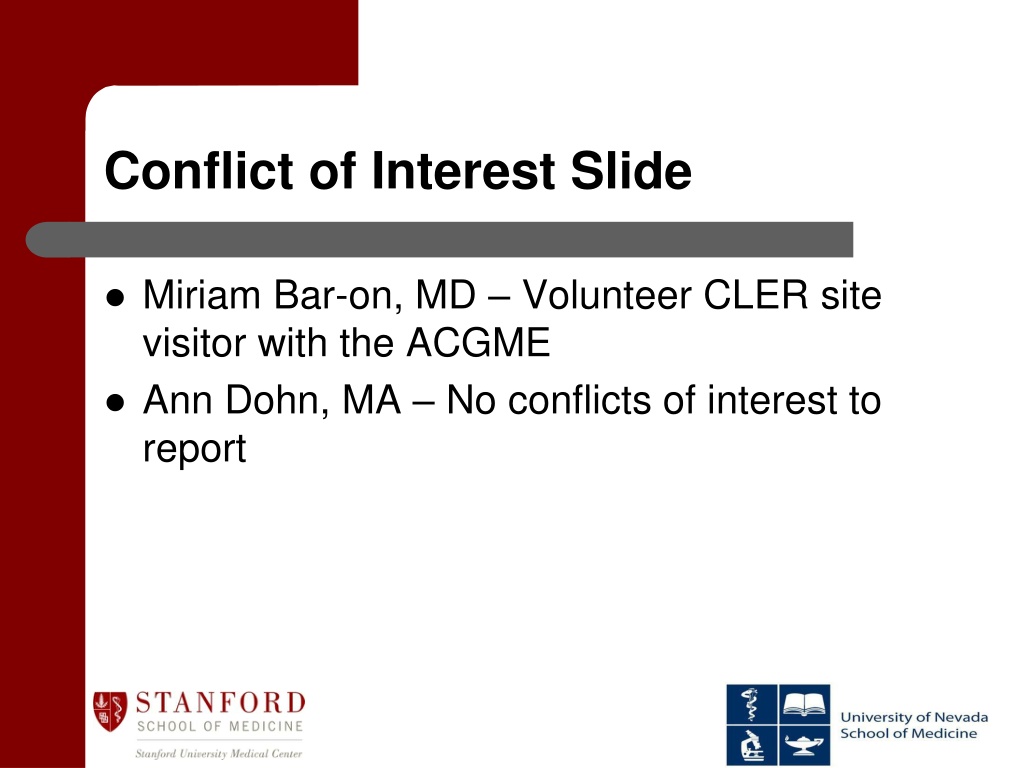Effective Techniques for Handling Difficult Encounters in Medical Settings
This presentation delves into practical strategies for managing challenging interactions within medical environments, featuring case studies, debriefing sessions, brainstorming activities, and insights on effective communication styles. Attendees will gain valuable tips and tools to navigate complex situations, fostering a conducive work environment and constructive outcomes.
Download Presentation

Please find below an Image/Link to download the presentation.
The content on the website is provided AS IS for your information and personal use only. It may not be sold, licensed, or shared on other websites without obtaining consent from the author. Download presentation by click this link. If you encounter any issues during the download, it is possible that the publisher has removed the file from their server.
E N D
Presentation Transcript
Conflict of Interest Slide Miriam Bar-on, MD Volunteer CLER site visitor with the ACGME Ann Dohn, MA No conflicts of interest to report
SES 128: Continuing the Conversations Techniques for Difficult Encounters Miriam Bar-on, MD, DIO, University of Nevada Ann Dohn, MA, DIO, Stanford
AGENDA Introduction Case Studies De-brief Brainstorm Tips/tools to use Practice Wrap Up
Introduction Where are we as a group? Who? DIOs Program Directors Faculty Coordinators/Administrators What are our biggest issues? What can you take home?
Case Studies Examples of some good and bad conversations
Case Study # 1 Failure to progress resident
Case Study # 2 Faculty misbehavior
Case Study # 3 Sexual Harassment (resident to resident)
De-brief De-brief on reactions of the group to the case studies
Find Your Style Brief quiz .
Can We Talk? Understand your style and its impact Competing Collaborating Compromising Avoiding Accommodating Adapted from Thomas-Kilmann
Can We Talk? Multi-dimensional problem solving Many perspectives Different objectives Integrative process
Can We Talk? Create opportunities for mutual gain Reframe Find shared interest Generate options Give and get
Can We Talk? Conflict escalators Enemy image Simplification Polarization Emotions Humiliation Investments The obsession to win
Can We Talk? De-escalators Humanize Perspective Save face Desire to settle Share savings Apology
Can We Talk? Process of Change Self Interest Aligned Interest Enlightened Interest Enlarged Interest
Can We Talk? Getting started: Define the problem Find multiple dimensions Create mutual benefit Reach agreement
Can We Talk? Getting started (continued): Who are the parties? What is their view of the problem? What are the stakes for them? What is the history of the problem?
Can We Talk? What do the parties have to gain/lose? What outcomes are they willing to accept? What outcomes do they want?
Can We Talk? Generating options: Brainstorming Innovation Flexibility
Contact us! adohn1@stanford.edu mbar-on@medicine.nevada.edu

